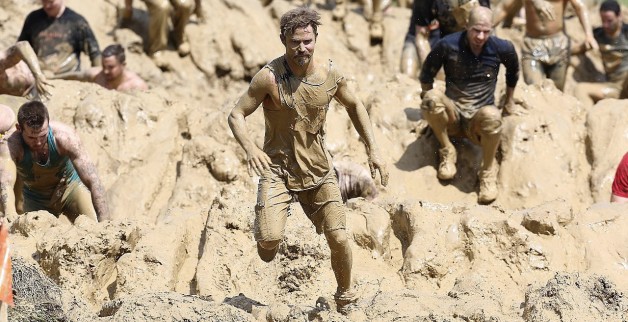The Tough Mudder is twelve miles of physically challenging and psychologically intimidating obstacles with names like Mud Mile, Electroshock Therapy, Firewalker, Walk the Plank, and so on. There are about twenty-five obstacles in the whole event, and usually included are a few “mystery” obstacles. Participants are almost guaranteed to get scratched up, completely filthy, and slightly singed.
There are a number of reasons why someone enters an event like this. Some participate to impress their friends, family, or coworkers. Others do it to get in shape. Still others try to add some variety to what they consider an otherwise dull life. The real reason they participate, however, is somewhat different.
The Tough Mudder corresponds to man’s desire for communal engagement in a task that involves the whole person. The course cannot be completed alone. Some of the walls, for example, are too high to clear by oneself, and most people will need a companion to get out of the waist-deep mud or the freezing ice water. The obstacles demand both upper-body and lower-body strength, and many of them—fire, electricity, tunnels, jumping from heights, and so forth—are also designed to test one’s mental toughness.
Modern life tends to divide soul from body and one person from another. Go to the nearest gym and you’re likely to see a dozen people running on treadmills spaced three feet apart, all listening to their iPods. The Tough Mudder breaks this pattern. The participants are forced out of themselves into close proximity and cooperation with each other.
This seems an excellent analogy for the life of faith, which is anything but a solo, sanitized endeavor. It’s simply impossible, in fact, to live a virtuous and vibrant Christian life in isolation. We need other people to support, encourage, and correct us as we press on toward our goal, “the prize of God’s upward calling in Christ Jesus” (Phil 3:14).
Of course, sometimes it seems things would be much easier if there weren’t all these other people around. Wouldn’t it be nice if we could move in a totally unfettered, autonomous way towards a clear goal? Perhaps. But the human condition is not like that. It’s full of gritty matter and slow progress. It’s more like The Tough Mudder than the treadmill.
Moreover, the most truly human activities, those things most worth doing, almost always involve close cooperation. Living in a family, singing in a choir, or playing on a football team: all of these are threats to our autonomy—and that’s a good thing. Otherwise, life would be less of an adventure, and when situations of adversity came up, we would only have ourselves to rely on. As we read in the Book of Ecclesiastes,
Two are better than one, because they have a good reward for their toil. For if they fall, one will lift up his fellow; but woe to him who is alone when he falls and has not another to lift him up. Again, if two lie together, they are warm; but how can one be warm alone? And though a man might prevail against one who is alone, two will withstand him. A threefold cord is not quickly broken. (Eccl 4:9–12)
It is true that the Lord sometimes chooses strange or frustrating means of getting us home. He used mud and spit, for example, to cure a man’s blindness (Mk 7:31–37). Couldn’t he have just said, “Be opened”? Why get so physical? Why get so up close and personal? Why even use words, for that matter? Because we are social, bodily creatures, and Christ came to redeem the whole of our nature, not just part of it. The mud and the spit and the words all go along with the Incarnation.
Before each Tough Mudder event, the participants take a pledge: “I help my fellow mudders complete the course.” Likewise, in the tough mudder of our own lives, we have an incomparably more sure and certain pledge from our Lord himself: “I have lost none of those whom Thou hast given me” (Jn 18:9).
God could have created a bunch of isolated automatons that live like Bubble Boy from Seinfeld. But he didn’t. Though it’s sometimes difficult to see that a muddy, complicated, communal slog is better than an air-conditioned, autonomous, consistent jog on the treadmill, it’s ultimately the happier way—and the more human.
✠
Image: The Tough Mudder







